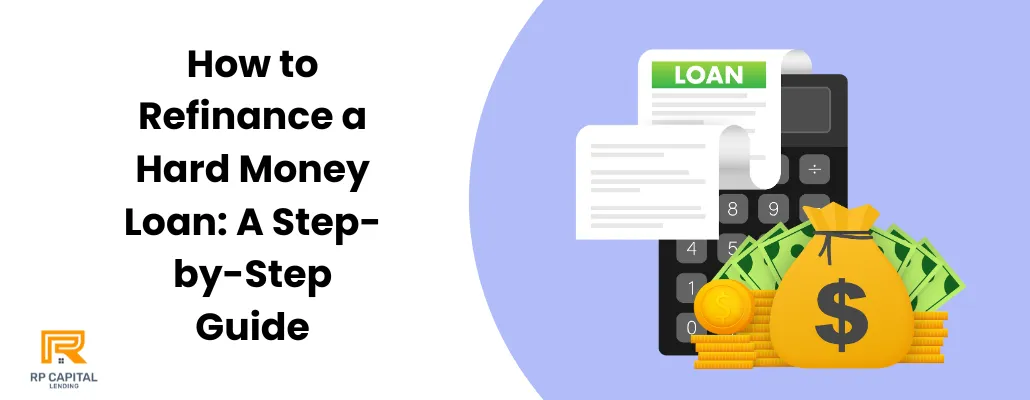Blog

How to Refinance a Hard Money Loan: A Step-by-Step Guide
Struggling with high-interest rates on your hard money loan? Refinancing could be your ticket to saving thousands.
This step-by-step guide will walk you through the process, ensuring you secure the best deal possible without the headaches.
What are Hard Money Loans?

Before considering refinancing, it's essential to have a clear understanding of what a hard money loan is. Typically, hard money loans are short-term, high-interest loans secured by real estate. They are often used by real estate investors to fund quick property acquisitions or renovations when traditional financing is not an option.
Why Refinance a Hard Money Loan?
Refinancing a hard money loan can provide significant benefits, especially if you've improved your financial situation or if market conditions have changed. Key reasons to refinance include:
1. Lower Interest Rates:
If interest rates have dropped since you first took out the loan, refinancing can reduce your overall costs.
2. Better Loan Terms:
You may be able to secure more favorable terms, such as a longer repayment period, which can lower your monthly payments.
3. Cash-Out Options:
Refinancing might allow you to take out additional cash if your property has increased in value, which can be used for further investments or other financial needs.ut the headaches.
Steps to Refinance a Hard Money Loan

Step 1: Evaluate Your Current Loan
Before you dive into refinancing, it's crucial to assess your current loan terms. Understand the interest rate, repayment schedule, and any penalties for early payoff. This will give you a clear picture of what you’re working with and what you need to improve.
Key Points to Consider:
Interest rate comparison
Loan term analysis
Early payoff penalties
Step 2: Determine Your Refinancing Goals
Ask yourself why you want to refinance. Is it to lower your monthly payments, secure a better interest rate, or extend the repayment period? Clarifying your goals will help you choose the right refinancing option.
Possible Goals Include:
Reducing interest rates
Lowering monthly payments
Extending the loan term
Accessing additional funds
Step 3: Research Potential Lenders
Not all lenders offer the same terms. It's essential to shop around and compare offers from multiple lenders. Look for those who specialize in refinancing hard money loans and offer competitive rates.
What to Look For:
Lender reputation
Interest rates and fees
Loan terms
Customer service quality
Step 4: Prepare Your Documentation
Lenders will require various documents to assess your financial situation. Gather all necessary paperwork, including your original loan agreement, proof of income, credit report, and property appraisal.
Commonly Required Documents:
Original loan agreement
Proof of income
Credit report
Property appraisal
Step 5: Submit Your Application
Once you've chosen a lender, it’s time to submit your refinancing application. Ensure all information is accurate and complete to avoid delays. Be prepared for the lender to perform a credit check and property appraisal.
Application Checklist:
Completed application form
Supporting documents
Credit check consent
Property appraisal request
Step 6: Review the New Loan Terms
After approval, carefully review the new loan terms. Pay close attention to the interest rate, repayment schedule, and any additional fees. If the terms meet your goals, proceed with closing the loan.
Things to Review:
New interest rate
Loan term length
Additional fees
Prepayment penalties
Step 7: Close the Refinanced Loan
If everything looks good, you can proceed to close the new loan. This step will involve signing the loan agreement and paying any closing costs. Once complete, your old loan will be paid off with the new one.
Closing Process:
Sign the new loan agreement
Pay closing costs
Confirm payoff of the original loan
Begin repayment of the refinanced loan
Timing Your Refinance
Timing is crucial when it comes to refinancing. Ideally, you want to refinance when interest rates are low, your property has appreciated in value, or when your credit score has improved. Additionally, consider the remaining term of your hard money loan. Refinancing too early might incur penalties, while waiting too long could result in missed opportunities for better terms.
Frequently Asked Questions (FAQs)
1. What is the main benefit of refinancing a hard money loan?
Refinancing can lower your interest rate, reduce monthly payments, or extend the loan term, making it more affordable over time.
2. Can I refinance if my credit score has improved?
Yes, a better credit score can qualify you for lower interest rates and better loan terms.
3. Are there any risks associated with refinancing a hard money loan?
Yes, potential risks include closing costs, prepayment penalties, and possibly extending your debt repayment period.
4. How long does the refinancing process take?
The process typically takes 2 to 4 weeks, depending on the lender and your preparedness with documentation.
5. Can I refinance a hard money loan more than once?
Yes, as long as it makes financial sense and you can secure better terms, refinancing more than once is possible.
Conclusion
Refinancing a hard money loan can be a strategic move to improve your financial situation, but it requires careful consideration and planning. By following these steps and understanding the key elements, you can make an informed decision that benefits your long-term financial health.
Disclaimer: Loans only apply to non-owner occupied properties. Rates, terms and conditions offered only to qualified borrowers, may vary upon loan product, deal structure, other applicable considerations, and are subject to change at any time without notice.
Copyright © 2025. All Rights Reserved.


